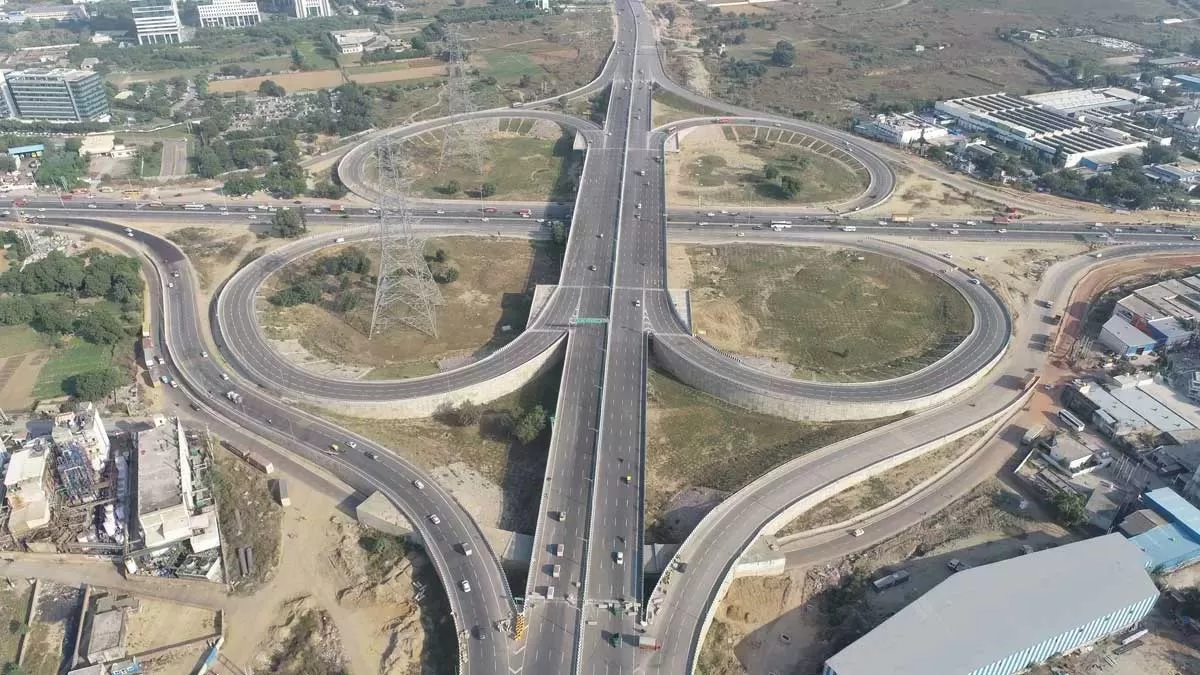India boasts of the second largest road network in the world, stretching over about 67 lakh kilometres (KM) as of July 2024. This vast network transports around 64.5% of all goods in the country and handles approximately 90% of India’s total passenger traffic. The network has witnessed significant expansion and modernisation, primarily in the past one decade, driving the country's economic growth and regional development.
With the government's focus on connectivity, India's road infrastructure sector is all set for transformative growth in the coming years. As of July, 25, 2024, India has a total of 146,145 kilometres of National Highway, while 12,349 kms of NH have been constructed in FY24. The government has also committed to develop 27 greenfield corridors comprising expressways and access-controlled highways, spanning 9860 Kms over the next few years.
This is in line with the government’s masterplan 2047 and making logistics more efficient. According to a study, logistics costs in the country range between 7.8% to 8.9% of the total economic output. The government aims to make it comparable to global standards and rank among the top 25 countries in the world by 2030. As per the World Bank’s Logistics Performance Index (LPI) 2023 ranking, India stands at 38th position among 139 countries globally.
The national masterplan for highways and expressways also plans to more than double the distance covered by trucks in a day to 800 kms from existing 300-350 kms a day.
Under the masterplan for the development of the national highways and expressways network for 2047, the government plans to build a total of 50,000 Kms of access-controlled expressways.
Going ahead, several key trends and upcoming projects are set to redefine the country's road infrastructure’s landscape. Future directions will likely focus on the expansion of expressway networks, development of smart roads, and the construction of mega bridges to enhance regional connectivity. Areas such as green infrastructure, sustainable urban transport systems, and public-private partnerships (PPP) will see huge investment opportunities to power these ambitious projects.
Here are the key trends and upcoming projects that will redefine the future of India’s road network:
Expressways and national highways
The future of India's road infrastructure will see the expansion of expressways and national highways, designed to meet the growing demands of a rapidly urbanising population and increasing vehicular traffic. The government's ambitious Bharatmala Pariyojana program, Parvatmala Pariyojana, development of multimodal logistics parks and PM Gatishakti framework is a clear indicator of this direction. Mega road projects such as Delhi-Mumbai Expressway, Amritsar-JamNagar Expressway, the Ganga Expressway, Char Dham National Highway, and the Chennai-Salem Expressway will significantly reduce travel time between key economic hubs and enhance the efficiency of goods movement across the country.
Bridge projects
In addition to road and expressway development, India is set to undertake several mega bridge projects that will enhance regional connectivity and support economic growth. Notable upcoming projects include the construction of the Mumbai Trans Harbour Link, which will be India's longest sea bridge, and the Dibang River Bridge in Arunachal Pradesh, which will connect remote areas of the Northeast to the rest of the country and 4.5 km-long six-lane bridge across the Ganga River in Bihar that will connect Digha in Patna with Sonepur in Saran. These bridges are not only engineering marvels but also vital links that will drive economic activity in underdeveloped regions.
Smart Technologies
The integration of smart technologies is another trend shaping India's road infrastructure sector. Smart roads, equipped with sensors, cameras, and communication systems, will enable real-time traffic management, improve safety, reduce congestion and enhance the overall driving experience. These technologies will enable real-time monitoring of road conditions, automated toll collection, and intelligent traffic systems that can adapt to changing conditions. The National Highways Authority of India (NHAI) is already exploring the implementation of such technologies in new projects, with a focus on creating a seamless and efficient transportation network.
Green Infrastructure
The adoption of green construction practices, including the use of recycled materials and eco-friendly technologies, will become increasingly important. The government is likely to encourage the development of green highways, which integrate tree plantations, rainwater harvesting systems, and solar-powered lighting. The adoption of electric vehicles and the development of charging infrastructure will further contribute to the modernisation of India's road network. These initiatives will not only reduce the environmental impact but also contribute to India's broader goals of reducing carbon emissions and combating climate change.
Public-Private Partnerships (PPP)
With the government’s focus on mobilising private sector capital, public-private partnerships will play a crucial role in financing and executing large-scale infrastructure projects. The Infrastructure Investment Trusts (InvITs) model is may gain traction, allowing for more efficient allocation of resources and risk-sharing between the public and private sectors.
The article is authored by Sanjay K. Sinha, Founder and MD, Chaitanya Projects Consultancy.





















